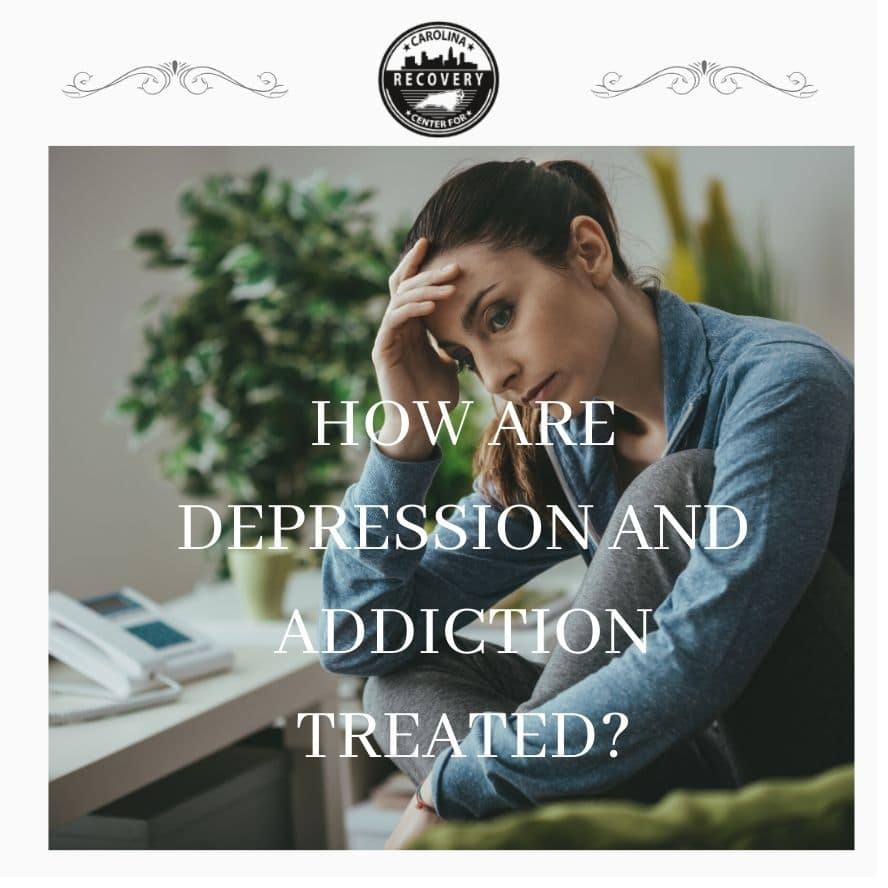How are Depression and Addiction Treated?

Medically Verified: 2/1/24
Medical Reviewer
Chief Editor

All of the information on this page has been reviewed and verified by a certified addiction professional.
Depression is a serious and chronic mental health condition that can affect every aspect of a person’s life. It can promote isolation from loved ones, poor lifestyle habits, and, in some cases, substance abuse and addiction. Studies show that nearly ⅓ of people who suffer from clinical depression also abuse drugs and alcohol.[1]
Substance abuse of any kind may be able to temporarily soothe symptoms of depression, however, it can also spiral into a dangerous addiction that causes depression to get worse in the long run. Left untreated, co-occurring depression and addiction can lead to risky behaviors, suicidal thoughts, overdose, and more.
Dual diagnosis addiction treatment programs in North Carolina use integrated treatment techniques to combine the most effective aspects of addiction treatment with mental health care. Effective treatment for depression and addiction can reduce the risk of relapse after treatment and help individuals live driven, fulfilling lives.
Understanding The Relationship Between Depression and Addiction
People who suffer from depression may abuse drugs or alcohol as a form of self-medication. With no healthy coping mechanisms, substances can feel like a way to soothe painful feelings of low self-esteem, hopelessness, and despair. Over time, drug or alcohol abuse can actually make depressive episodes worse. People who struggle with addiction often experience more frequent and more severe symptoms, negative thoughts, and destructive behaviors.
Individuals who struggle with co-occurring depression and addiction often have increased morbidity and mortality along with worse treatment outcomes and higher treatment costs compared to people who only struggle with one condition.[2] However, both conditions are manageable with the help of a comprehensive treatment program. As a result, it’s important that treatment is tailored to meet the specific needs of these individuals.
Treatment for Co-occurring Depression and Addiction
Depression and addiction are treated through dual diagnosis programs that address co-occurring disorders. Treatment typically consists of the following elements:
Antidepressant Medications
Antidepressant medications can help stabilize brain chemistry and reduce symptoms of depression. They are also useful in the treatment of people who have recently detoxed from addictive substances.
There are many types of antidepressant medications available, and it may take several tries to find the right one for a patient. Some of the most widely used antidepressants include:[3]
- Selective serotonin reuptake inhibitors (SSRIs) – These are usually the first medications prescribed because they are safer and have fewer side effects than other types of antidepressants. SSRIs include Prozac (fluoxetine), Zoloft (sertraline), Lexapro (escitalopram), and Celexa (citalopram).
- Serotonin-norepinephrine reuptake inhibitors (SNRIs) – These are prescribed if SSRIs are ineffective. Examples of SNRIs include Cymbalta (duloxetine), Effexor (venlafaxine), and Fetzima (levomilnacipran).
- Atypical antidepressants – These medications can treat depression, but don’t fit into any other antidepressant category. These include Wellbutrin (bupropion), Remeron (mirtazapine), and trazodone.
- Tricyclic antidepressants – These medications are very effective, but are known to cause moderate to severe side effects. Examples include Tofranil (imipramine), Norpramin (desipramine), and Vivactil (protriptyline).
- Monoamine oxidase inhibitors (MAOIs) – MAOIs may be prescribed when other antidepressants don’t work, however, these medications require an extremely strict diet because of potentially deadly interactions with common foods. Examples of MAOIs include Parnate (tranylcypromine) and Nardil (phenelzine).
Dual Diagnosis Psychotherapy
Psychotherapy, also known as talk therapy or behavioral therapy, is at the foundation of treatment programs for both depression and addiction. Psychotherapy allows individuals to talk about their experiences and feelings so they can process these things and develop healthier coping skills. Examples of psychotherapy include cognitive-behavioral therapy (CBT) and dialectical behavior therapy (DBT).[2]
Psychotherapy can help patients accomplish many goals, such as:
- Identifying negative beliefs and behaviors and replacing them with healthier ones
- Exploring different types of relationships and improving communication skills to develop more positive interpersonal interactions
- Finding ways to cope with or solve problems
- Identifying situations that contribute to depression and how to change those situations
- Setting realistic goals
- Developing the ability to share one’s thoughts and feelings
- Alleviate the emotional pain caused by depression
Support Groups
Loneliness and isolation are shared symptoms between depression and addiction. Isolating oneself from loved ones can make depression worse, and it can also enable addiction to go on unnoticed. However, individuals who have a strong support network experience fewer depressive episodes and are more likely to stay sober.[4]
Individuals may find a support group through their treatment center’s alumni program, at a 12-Step fellowship, in a church, or at a mental health resource center.
Lifestyle Changes
While a comprehensive rehab program can help address depression and addiction, individuals must also make lifestyle changes to promote a healthy, sober lifestyle. Self-care tips that can help continue treating these conditions include:
- Ongoing counseling
- Avoiding drugs and alcohol
- Sticking to a routine and a schedule
- Taking prescribed medications on a daily basis
- Spending time with friends and family
- Eating a healthy and nutritious diet
- Getting enough exercise
- Spending time outdoors
- Healthy habits like yoga, meditation, or art
Treatment for Depression and Addiction at Carolina Center for Recovery
Depression can feel crippling, but drugs and alcohol are no way to cope. Here at Carolina Center for Recovery, we can help you overcome depression, give up drugs and alcohol, and begin living a peaceful, self-directed life. If you or a loved one is struggling with depression and substance abuse, contact us today. An admissions counselor is standing by, eager to take your call.
References:

